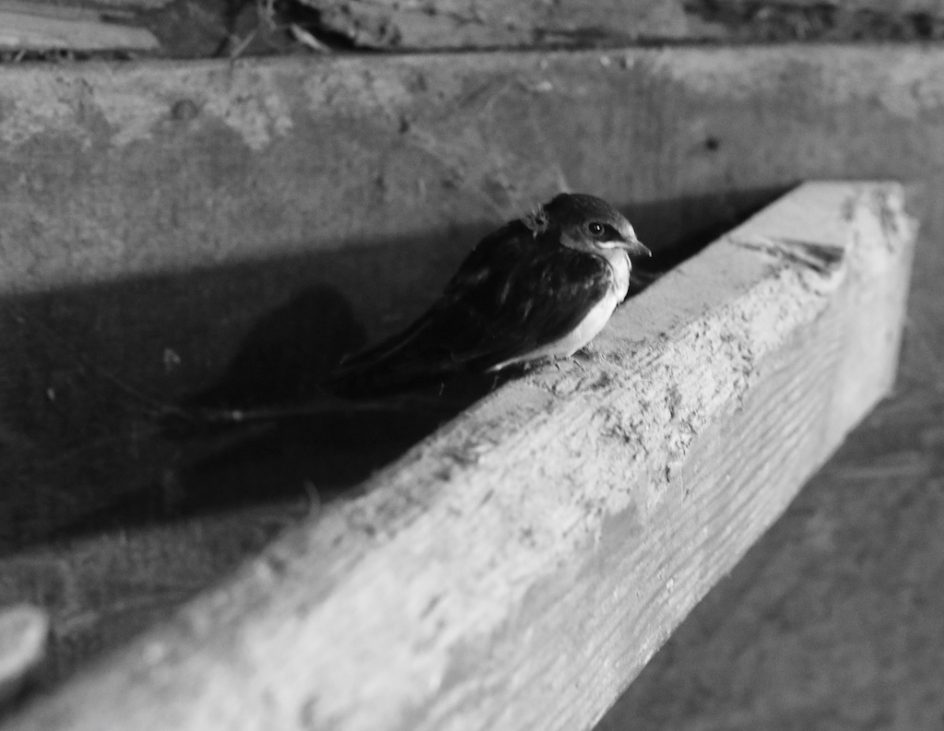
Maria noticed yesterday that a baby barn swallow had fallen out of the next in the rafters in our barn and was sitting by itself on the cement floor. He seemed to be all right, and we weren’t sure what to do. Get a ladder and put him in the nest? Try and feed him?
It was a vulnerable spot for a newborn bird, the barn cats are not into animal rescue, and there is this instinct to do something. If he was alive, it probably meant his mother was feeding him, and barn swallows are notoriously attentive to their children.
This morning, when i went into the barn to check on him and take his picture, the barn swallows – they are as wonderful and precious on the farm as barn cats – began dive-bombing me as barn swallows will do when you get near a nest with their babies.
They swoop down within inches of my head and face desperate to distract me from their vulnerable babies. Last week, I saw a dozen of them drive Flo out of the apple tree when she got too close to one of their nests. They are willing to sacrifice themselves in an instant to save their babies.
Maria and I talked about the baby sparrow, and what we decided to do was nothing. We respect nature and it’s laws, we consider animal rescue to be a thoughtful – and for us, occasional – practice. We don’t wish the farm to be a rescue facility or a veterinary clinic. We tried to save a baby bird last week – he was riddled with maggots – and then put him out of his suffering instead. We were reminded of the limits of human beings interfering with the lives of animals.
It is very easy to harm one of those fragile birds, sometimes they die of fright when mishandled, sometimes are rejected by their mothers. This was her job, we had to leave it to her.
We cannot save every animal in trouble. It would be so easy to spend all of our time and all of our money rescuing animals, jumping on an emotional roller coaster than never stops.
When the beautiful bear was hit by a truck and lay dying in agony in our pasture, a car filled with a family of people who said they were animal rights activists – drawn by the police scanner – pulled up to our fence and began shouting at us and the police to save the bear, get him treatment, not to shoot him.
They didn’t see the accident, didn’t see the bear, didn’t know us, but they told the sheriff’s deputy that they know we all wanted to kill the bear and they wanted to stop us. The parents had been hard at working teaching their children to mistrust strangers and the police (they didn’t see one of the deputies cry after the bear died.)
As the poor creature was shot and killed, their screams and pleas echoed through the pasture. Their parents had taught them to shout and make judgements, but not much about the real world.
Animals live real lives, as people do, and their lives cannot always be made perfect any more than ours can. We can not save them all, we don’t see a fraction of the animals who get sick and die. It is essential for animals to die in order for other living things to live.
And isn’t this a powerful boundary for me? I respect the sanctity of their lives, they are not my children or dependent and helpless creatures.
Playing with nature is rarely good or successful. It is, in some ways, like playing God. There are times when you can help – Izzy and Rosemary – and times you can’t. We often pull over and help a turtle get across the road. Yesterday, we turned away from drama and angst and got on with our lives.
I don’t want to be those people in the car. I checked on the barn swallow several times yesterday, he seemed alert and healthy. Obviously, his mother was coming to feed him. I don’t wish to exploit needy animals in order to feel good about myself. The danger was the barn cats, murderous and savvy creatures, but they rarely had cause to come into this part of the barn, there are lots of mice and moles around elsewhere.
This morning, I’m happy to report, our baby barn swallow had hopped up onto a hay rail on the side of the barn. He obviously was able to get himself off the floor, he looked calm and alert, he must have been feed. It’s possible he’s already flying a bit. I ran for the camera, took his photo and wished him well.
The young swallow looked at me curiously, perhaps he thought I might have a bug or a worm to offer. He was not afraid of me, and seemed happy on his perch. “Don’t hang around there too long,” I suggested. “There are barn cats around.” And I left. Up above, I heard his brothers and sisters peeping some messages to him. Maybe they were warning him to stay away from the strange human with the big camera.
Rescue is one of the most complex emotional situations in the animal world. It asks us to look at ourselves, our motives, our limits and or own needs. Whatever we do, we learn from it every time.
